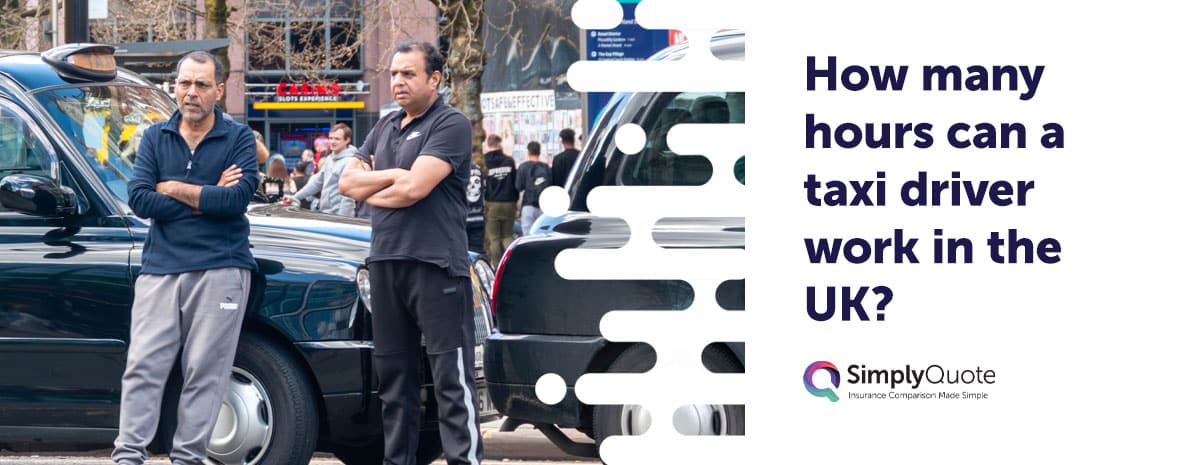How many hours can a taxi driver work in the UK?
A full-time taxi driver shouldn’t work more than 10 hours per day in Great Britain; however, this is more a guideline than a strict rule.
It’s all about balancing your on-duty time with sufficient rest periods to avoid fatigue. Continuously exceeding the recommended guidelines can increase the chances of being in an accident which could impact your taxi insurance premiums and put other road users at risk.
In this guide, we’ll break down how many hours cab drivers in the UK generally work, what factors impact their working hours, and why it’s important to avoid exceeding these limits.

UK Taxi Driving Hours: What you need to know
Since most private hire taxi drivers are self-employed, they can choose their working hours and are not governed by local authority laws. Some days may require longer hours due to higher demand, whereas quiet days result in fewer hours behind the wheel.
Let’s take a closer look at a few recommended guidelines:
Daily and weekly limits
- Daily limit: Under GB rules, a taxi driver shouldn’t work more than 10 hours per shift.
- Weekly limit: A full-time UK cabbie generally works between 40 and 60 hours weekly.
Rest periods
According to GB domestic rules, hackney carriage and private hire drivers are advised to take:
- A 30-minute break after 5.5 hours of driving
- 45 minutes off in an 8.5 hour shift
- A 10-hour rest period before your first duty and immediately after the last duty in a working week
- 24 hours off every fortnight
Factors affecting working hours
Several factors can influence the number of hours a taxi driver works:
- Demand: Busier times such as peak hours, bank holidays, and weekends may require longer working hours.
- Personal preferences: Self-employed taxi drivers base their schedules around their lifestyle and other commitments. For instance, part-time Uber drivers may only work over weekends whereas full-time drivers may have a more traditional 9 to 5 schedule.
- Shift patterns: Some drivers may opt for shift work, such as mornings, evenings, or bank holidays, to capitalise on supply and demand.
- Seasonal needs: Drivers’ hours may increase in warmer months when more locals and tourists are out and about.
- Location: Cab drivers in urban areas tend to work longer hours than those in rural areas (e.g. London vs. Dartmoor).
Bonus read: UK Taxi Driver Shifts Explained
Looking for cheap taxi insurance? Get your quote today!
Get QuotesWhat happens if you exceed taxi working hour limits?
There are many consequences for continuously working long hours, such as:
Driver fatigue
Taxi driving is stressful and requires serious concentration. Driving for prolonged periods without sufficient rest can lead to fatigue, which can impair your:
- Judgement
- Reaction time
- Overall driving ability
Burnout
Cabbies may want to work more hours to increase their income stream but excessive time on the road can eventually lead to burnout. This state of physical and emotional exhaustion can negatively impact your health and well-being in the long run.
Increased risk of car accidents
Driving when tired can lead to errors in judgement, reduced awareness, and slower reaction times when behind the wheel, increasing the chances of being involved in a collision.
Furthermore, reckless driving can increase your taxi insurance premiums, especially if you have telematics car insurance. You could also have your PCO licence revoked if you’re deemed an unsafe driver.
Final thoughts
While no legal rules apply to taxi and private hire driver’s working hours, your health and well-being should be your top priority.
By factoring in sufficient rest between your shifts, you’re taking proactive steps to ensure the safety of everyone on the road.
Frequently Asked Questions
Friday and Saturday nights are generally the best times for taxi work due to increased nightlife activity.
In the UK, there are no legal stipulations when it comes to taxi driving – just suggested guidelines to follow. However, EU taxi operators are subject to specific rules regarding their working hours, such as:
- You may not drive more than nine hours per day – this can be extended to 10 hours twice a week.
- The maximum driving time is capped at 56 hours per week.
- Drivers cannot exceed 90 hours over any two consecutive weeks.
No, private hire vehicle (PHV) drivers and hackney carriage operators do not need tachometers (devices that monitor how long the engine is running) in the UK. These devices generally apply to HGV drivers and vehicles over 3.5 tonnes.
